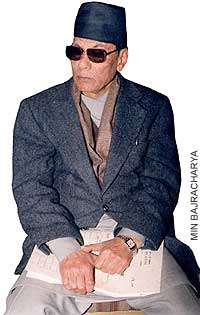A day after King Gyanendra issued three ordinances, including the Finance Ordinance 2003, Finance Minister Dr Badri Prasad Shrestha explained the provisions as they relate to revenue, taxation, investment, exports and tourism. Excerpts:
 On the objective of the ordinance:
On the objective of the ordinance:
The main objective of the ordinance is to maintain macro-economic stability by ensuring financial balance and encourage domestic industries through the extension of maximum possible facilities, particularly the export-oriented ones.
On new measures:
The government will issue bonds to those industries that are yet to get duty drawback amounts from the government. Provisions have been made to import raw materials for export-oriented industries upon the submission of the bank guarantee for claiming excise duty. Earlier there was the practice of submitting cash guarantee.
On exports:
The government will provide bonded warehouse facilities for the export of readymade garment products to India also. Earlier, such facilities were available to cent percent export-based industries only that exported their products to third countries.
On tourism:
The government will provide maximum possible facilities to hotels and other tourism industries to bail them out. The committee formed under the chairmanship of the finance minister to recommend measures to rehabilitate sick units will be activated.
On revenue administration:
ASYCUDA, the computerised customs network, currently functional in five major customs points, would be expanded to other three customs points. Measures would be taken to make the revenue administration more effective. In order to check the under valuation of the imported goods, the implementation of post clearance audit system would be made more effective. A track will be kept on all transactions of under-valued goods and they will be brought under the tax net. The provision of reference price of major imports has been reintroduced to check under valuation.
On taxation:
All business firms that are not obliged to register for Value Added Tax (VAT) will have to clearly display in writing that their total transactions fall below the mandatory Rs 2 million. A task force has been formed under the Inland Revenue Department (IRD) in order to ensure the issuance of bills and to arrest revenue leakages. An income tax desk will be set up under the IRD to sort out existing confusions and clarify some contradictions in the Income Tax Act 2058 BS. Arrangement has been made to ensure clearance of goods associated with export-import industries within a specified time.
On the performance of the economy:
This year the GDP growth has been estimated to be between 2 to 2.5 percent only. Last year the GDP growth had turned negative (-0.63 percent). There is no lack of resources to finance development programs. The revenue mobilisation has grown by over 7 percent.
Total outlay of this year's budget, Rs 96.12 billion, remains the same. Total regular and development expenditure in the first five months of the current fiscal year has reached Rs 21.96 billion. Though regular expenditure grew by over 6 percent during this period development expenditure declined. The budget deficit of Rs 3.74 billion has been met by mobilising internal and foreign loans. The revenue collection stood at Rs 17.65 billion during the first five months (of the current fiscal year) registering a growth of over 5 percent. The rate of resource mobilisation continues to increase.
On rehabilitation of sick units:
The government had allocated Rs1.12 billion to provide concessional loans to the sick industries last year. This year the sum available is Rs1.5 billion. Nepal Rastra Bank has made available refinancing to commercial banks at 4 percent interest rates. The commercial banks will, in turn, make the loan available to the sick units as per the set criteria at 6 percent interest rates. The government will re-define the sick units and activate the committee to look into this issue according to need.
On defence and election expenditures:
The trend of defence expenditures can be seen only after mid-term evaluation of this year's budget. We will adjust the expenditures, after the assessment, if the need arises. There are enough funds available for holding elections in the budget within this fiscal year.
On foreign aid:
The receipts of foreign loans and grants in this fiscal year are very encouraging. The World Bank has categorised Nepal for Base Case scenario from the Low Case scenario looking at the satisfactory performance in the economic reforms programs implemented by HMG/Nepal. This means that Nepal will qualify now for loans up to $ 350 million from the World Bank whereas Nepal was receiving the loan of $ 50 million per annum over the last three years.
On the legality of the ordinance:
This is up to the Supreme Court to decide.


